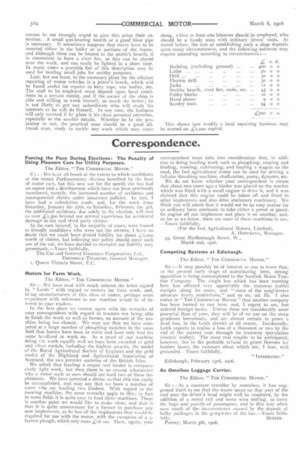Correspondence.
Page 16

If you've noticed an error in this article please click here to report it so we can fix it.
Forcing the Pace During elections: The Penalty of Using Pleasure Cars for Utility Purposes.
The Editor, "THE COMMERCIAL MOTOR.
Sr :—We have all heard of the extent to which candidates at the recent Parliamentary election benefited by the loan of motor cars, but this new use for the speedy car has had an aspect and a development which have not been previously mentioned, namely, the increased number of accidents and consequential claims under insurance policies. In fact, I have had a calculation made, and, for the week from Saturday, January the 27th, to Saturday, February the 3rd, the additional accidents, due solely to the election, will cost US over .1,500 beyond outnormal experience for accidental damage to car and third party As the cars insured, in the majority of cases, were loaned to friendly candidates who were not the owners, I have no doubt that we could have denied liability for about 4,•L000 worth of claims, but believing our policy should cover such use of the car, we have decided to interpre't our liability very generously.—Yours faithfully,
The Car and General Insurance Corporation, Ltd., FREDF.RICK THORESR1C, General MI tnager.
1, Queen Victoria Street, E.C.
Motors for Farm Work.
The Editor, " TEE COMMERCIAL MOTOR."
Sir :—We have read with much interest the letter signed by " Leeds " with regard to motors for farm work, and, being manufacturers of this class of motor, perhaps some experience with reference to our machine would be of interest to your readers.
In the first place we cannot agree with the remarks of your correspondent with regard to tractors not being able to finish the work as well as horses, on account of the machine being too clumsy. We may say that we have competed at a large number of ploughing matches in the same field that horses have been at work and have only had the same headland to work on. As a proof of our machine doing Cie work equally well we have been awarded 21 gold and silver medals, including, the highest awards, the medal of the Royal Agricultural Society of England and the gold medal of the Highland and Agricultural Association of Scotland, the two premier societies of the British Isles.
We admit that hauling a reaper and binder is comparatively light work, but then there is no reason whatsoever why a motor such as ours should not haul two of these implements. We have patented a device so that this can easily be accomplished, and may say that we have a number of users v.-ho are hauling two binders. With regard to the mowing machine, the same remarks apply to this; in fact in some fields it is quite easy to haul three machines. There is another point we would like to make clear, and that is that it is ratite unnecessary for a farmer to purchase any new implements, as he has all the implements that would be required for use with the motor, with the exception of a 3furrow plough, which only costs ,L;i6 los. Then, again, your correspondent must take into consideration that, in addition to doing hauling work such as ploughing, reaping and binding, mowing, cultivating, and hauling a wagon on the road, the Ivel agricultural motor can be used for driving a full-size threshing machine, chaff-cutter, pump, dynamo, etc.
We do not know whether your correspondent is aware that about two years ago a binder was placed on the market which was fitted with a small engine to drive it, and it was claimed that this engine could be taken off and fitted to other implements and also drive stationary machinery. We think you will admit that it would not be an easy matter for art ordinary farm mechanic to take either a petrol or paraffin engine off one implement and place it on another, and. as far as we know, there are none of these machines in use. —Yours faithfully, (For the Ivel Agricultural Motors, Limited), A. HOFFMAN N , Manager. 45, Great Marlborough Street, W.,
Sir :—It may possibly be of interest to you to learn that, at the present early stage of motor-busing here, strong opposition is being contemplated to the Scottish Motor Traction Company. The single bus which has been running here has affected very appreciably the tramway (cable) receipts along its route, and " some of the magistrates advocate heavy restrictions," and so on, ad. lib. I also notice in "THE COMM F.RCI AL MOTOR " that another company has been formed to run here, and, I regret to see, has ordered foreign buses. Unless these are considerably more powerful than of yore, they will be of no use on the steep gradients hereabouts, and are almost certain to prove a dead loss, in the Leith district at all events. Incidentally, Leith expects to realise a loss of a thousand or two by the end of the current year through its tramway speculation (electric trolley). The most real trouble to be anticipated, however, lies in the probable refusal to grant licenses for further buses, the rumours about which are, I fear, well grounded.-Yours faithfully,
Sir :—As a constant traveller by motorbus, it has suggested itself to me that the waste space on that part of the roof over the driver's head might well be employed, by the addition of a metal rail and some wire netting, to carry the bags and parcels of passengers, and in this way often save much of the inconvenience caused by the deposit of bullq packages in the gangways of the bus.—Yours BUZZER. Putney, March sth, 1906.




















